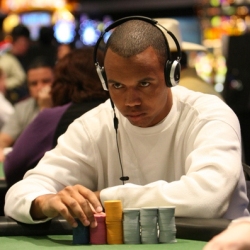Playing Poker A Tough Way to Make A Living

The idea of being a professional poker player has undoubted appeal. After all, who wouldn’t want to make a living taking to the live and online tables and putting their skills to the test in high stakes tournaments? Poker players also enjoy an independent lifestyle and have the opportunity to travel the world and earn money doing an activity that they enjoy. It may sounds like a dream job, but the truth is that being a successful professional poker player who survives only by playing the game is largely a dream these days considering the current state of poker.
Times Have Changed
Over the past decade, the poker industry has suffered a dramatic reversal of fortunes. Back in 2003, when an amateur won the WSOP Main Event for $2.5 million, Chris Moneymaker provided inspiration for thousands of players to take up the game themselves, thus sparking the “poker boom”. By 2006, however, the “boom” was over as more and more players had benefited from the numerous training sites, poker books, and other resources that allowed them to improve their game at the expense of recreational players. Without the addition of fresh blood the market subsequently became stale leading to the current declining popularity of poker as a recreational gambling game.
The Reality of Going Pro
So how feasible is it for someone with ambition to become a professional poker player in 2016? For wining players it’s still possible to become wealthy playing poker, but only around 0.5% of players are estimated to turn a profit from the game, and as professional player Terrence Chan warned his fellow competitors recently:
“If you are an online poker pro, and you have not made at least 100k/year in the last two years, you should strongly consider applying for a real job somewhere. If you are an aspiring poker pro and haven’t quite made the leap yet, you need to look long and hard about whether you really want to sign up for this grind.”
For the vast majority of players, turning a profit by the end of the year might be considered a result in itself, but even making$10,000 to $20,000 in a year would hardly be seen as “living the dream.” Part of the challenge of becoming a poker professional in today’s climate is that the overall skill level of players has increased significantly. Now that people can play poker 24 hours per day, 7 days per week at home if they wanted, newbies often possess just as much skill and knowledge of the game as players who have been playing the game for years. The Internet allows anyone to take classes, watch instructional videos, and follow tutorials that improve their overall skill set.
Amateurs Are Disappearing
While it’s harder to become a pro than ever before, the truth is that almost everyone who is playing these days is a pro at some level. Amateur or recreational players have been chased away from online poker tables. That is because it’s become harder and harder for someone who just wants to play a hand or two of poker occasionally to book a winning session, as more people are now using tracking software to anticipate players’ moves.
For online poker sites, the demise of the recreational player is alarming. Sites rely on recreational players to remain in the black. That’s why so many sites are now making changes to try and level the playing field for occasional players. Some sites have banned tracking software, or made it harder to use the technology. Others have introduced random table assignments to prevent “bum hunting” and therefore make things fairer. PokerStars even eliminated the top tier of their VIP program as a way to stop higher volume players from making amateurs shy away from the virtual tables.
Aware that such changes may sound the death knell for many of today’s online pros, many have now struck back by organizing boycotts of the site as they seek to force PokerStars to change its mind. They have failed in their endeavor thus far, although this week the boycott’s organizers, Dani Stern and Daniel Dvoress, were invited to Amaya Gaming’s Montreal headquarters to discuss the issues. Daniel Negreanu was also there representing his sponsored site, and as he commented after the meeting:
“It’s debatable whether Stars made the right changes, but I don’t think there is any question that anyone who saw the numbers would have disagreed that some kind of changes were absolutely necessary.”
The Future of Pros
Many industry experts believe that the days of professional poker players making a living by surviving just on their winnings has passed. While it seems like the generation of players that made it big at the same time as Tom Dwan may be the last of their kind, there is still some hope of earning a living in other ways related to poker. For example, Twitch is attracting millions of viewers, meaning there is an opportunity for skilled players to make money as gamers rather than by being bigger winners at the tables.










